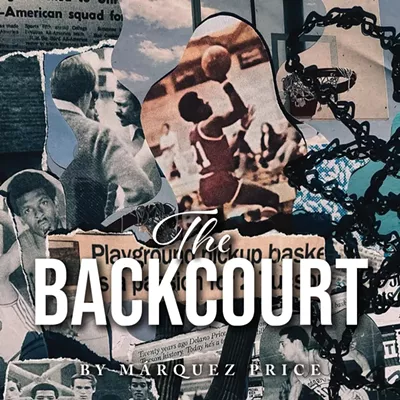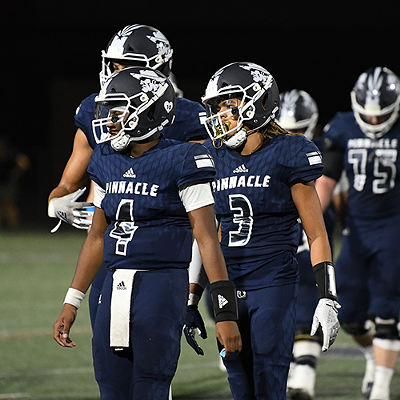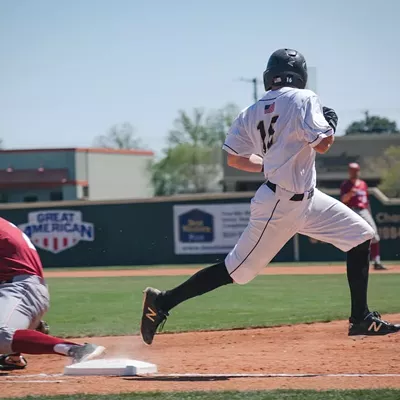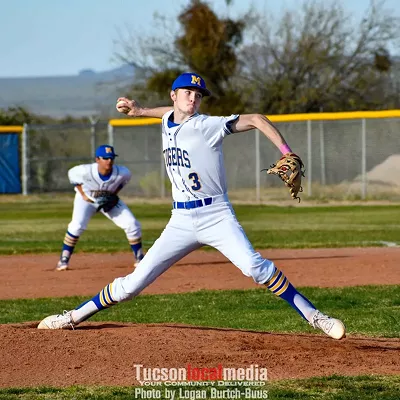It's an odd quirk that Thoreau's Walden Pond is less than 100 miles from Springfield, Mass., where Dr. James Naismith invented the game of basketball. While the two men were separated by a half-century in time, their legacies converge with stunning clarity and regularity in gymnasiums all over the country in an almost stunningly ritualized proceeding known as the adult recreation league.
A third of a century into Title IX, these leagues are still almost exclusively male, and the predictable and vulgar bursts of testosterone--both natural and forced--are enough to prompt a women's studies program to sprout up, in full bloom of justifiable man-hatred, at the nearest institution of higher learning.
It's a Monday night at the Lohse YMCA just north of the Main Library in downtown Tucson. Downstairs in the gym, the Monday night men's league is in full force. Like most top-level men's league games, this one is mostly a series of 1-on-1 vignettes with only the occasional flourish of team play sprinkled in. Defense is but a rumor. Rich Cruz, the league director, is officiating the game by himself, because his scorekeeper didn't show up, so the other ref has to run the clock.
Many of the game's participants played at least some college ball, but that's deep in the rear-view mirror. Some have gone thick in the middle, while others have long been thick in the head. One team has built and then blown a double-digit lead, and about halfway through the second half, the tension is building. Players begin to question every other call that Cruz makes, then two out of every three, and then finally every single one. The compactly built Cruz generally smiles and shrugs most of them off, but occasionally takes the time to try to explain one of them, to no discernable effect.
Some are surprised that Cruz is working the game at all. In a game two weeks earlier, after two opposing players had squared off, an enraged fan--a guy Cruz had known for years--rushed onto the court and barreled into him, sending Cruz flying backwards. The blow and/or the awkward landing separated Cruz's shoulder, and it'll be a few weeks before he knows whether he'll need surgery. It's one of the few times that Cruz has ever had to call the police, who are still searching for the assailant.
It was the third violent incident in the past year or so, a figure that, sadly, isn't far off the norm. "It's actually been getting worse," says Cruz. "There has always been trouble at leagues like this. There will always be a handful of guys who simply take things too seriously and forget that it's just a game. But lately, it seems like there are more of those guys, and their tempers seem to be a little bit shorter."
Cruz's "favorite" such incident involved a game that got way out of hand not too long ago. One team was made up of members of the law-enforcement community, while the other had several players who referee high school and college basketball games. Given the participants, "That one was rather absurd," understates Cruz.
The game is inside five minutes now, and something resembling defense begins to make its appearance. This, of course, means more physical contact between opponents, which means more jawing back and forth by players, and more pleading for calls from Cruz. If we could charge a nickel for every time the phrase, "C'mon, Rich!" is used, we could fund the war in Iraq and give ExxonMobil another well-deserved tax break.
Marcus Campbell, the best player in the game, grabs a defensive rebound and starts up court. A dizzyingly talented ballplayer, Campbell starred at Marana's Mountain View High, but through a certain indifference, he parlayed that promise into only two nonconsecutive seasons at Pima Community College. Still in his early 20s, he is constantly urged by teammates to try to catch on with a National Association of Intercollegiate Athletics (NAIA) college somewhere, and maybe play ball overseas. But for now, he's content to dominate various leagues around Tucson.
Standing 6-foot-5, long and lean, he's built like a forward, has killer post moves and can handle the ball like a guard. No one in town can actually guard him for an entire game, so he gets beaten on like a rented mule. And whereas NBA stars tend to get more favorable calls than they probably deserve, the opposite is true in rec leagues, where the top players often get pounded upon by the mere mortals. Campbell is remarkably even-tempered despite the abuse. He just makes up for it by clanging about half of his free throws.
"It's the one hole in my game," he says with a shrug.
Campbell plays on teams in several leagues around town. Indeed, during some parts of the year, it's possible to play six or seven nights a week. The best-known leagues, other than the Y, include those at the Jewish Community Center, at Kino Center down by Tucson Electric Park, and the City League at Randolph Park. Most leagues charge between $325 and $400 per team for a season (generally lasting between eight and 10 games), although the word is that the people at Randolph are thinking of charging a whopping $550 for the next league.
There used to be leagues running almost every night at Lakeside on the far southeast side of town, but an on-court incident bubbled over and led to the fatal shooting of a young Tucson man in May 2005, and Lakeside got out of the business. (A few years back, Chris Rastatter, who started off doing men's leagues and worked his way up to doing NCAA men's tournament games, ran the Lakeside league.)
Teams that play in these leagues usually take one of two forms. It's either guys from work, or homies you've been hanging with since high school. One team at the Y features Jeff Clark and Mikal Kidd, who, along with Hakim Rasul and Sammy Wade, made up a spectacular Pueblo team in the late 1990s. The workplace teams often get sponsored by the place of business. The others just have everybody throw in $40 or so to cover the entry fee. Hired guns like Campbell are often asked to play on certain teams and aren't even asked to make a financial contribution.
The league entry fees go to cover overhead costs and pay for championship trophies or shirts. The rest is used to pay the officials and scorekeepers. A quick check of the math shows that can't be a whole lot. The standard pay for refs in leagues like this is in the $10-$15 range for a game.
Not much for a life-threatening experience.
Cruz has been threatened on a few occasions, but he says he's never been all that concerned for his safety. "Guys get heated; they say things, then they apologize later. It's not fun, but it's not all that scary, either."
Just about everybody who has ever reffed in men's leagues has a story to tell. Ken Urdahl, one of the top Arizona Interscholastic Association officials who also does a significant number of college games every year, started off working in a men's league. "You talk about getting thrown in the deep end," he laughs. "You've got guys who show up half-drunk. Others are pissed off about work or their wife or some clown who cut them off in traffic. They bring all that baggage into the gym, and they think it's perfectly OK to take it all out on the refs.
"I see something similar when I ref college games. You have doctors and lawyers and business people who would never think of even raising their voice in the workplace, but they show up at a game and scream their lungs out, shouting the most ridiculous things." He pauses. "But in the men's league, it's more up close and personal."
He says he's glad that he started in the wild men's league and graduated to the more structured high school and college games. (A top-level high school varsity ref earns around $60 a game, while a top college ref can make several hundred dollars per.) He laughs when he recalls that he used to work for $10 a game. Would you do it again?
"No."
What if you got paid the same as a high-school game?
"No."
The same as a college game?
"Let's put it this way: I'm glad I did it, and now I'm glad I don't do it any more."
Brian Peabody, who had a decade-long run of phenomenal success as the boys' basketball coach at Salpointe Catholic High School, helped pay his way through college reffing men's leagues. Peabody walked an extra fine line, because he would often play in other leagues with or against many of the players whose games he officiated.
"Most guys are really cool. The basketball fraternity is deep, and we all have a lot of shared experiences. But every now and then, you'll get a guy who can't let things slide. They'd hold a grudge for months, waiting to get even for some call I made in the third quarter of a blowout.
"And then you've got those (quiet desperation) people. Those are the worst. I reffed a county league game up at CDO (Canyon del Oro) one summer right after Sean Elliott graduated from Cholla High. He had signed with the UA, and everybody knew who he was. Well, this older guy on the other team was deliberately trying to hurt (Sean). It was like this guy's best days were behind him, and Sean's (bright future) was ahead of him, and the guy couldn't take it. We had to kick him out of the game and then call the sheriff."
Even that's not Peabody's worst story. "We were reffing at the old Y on Fifth. It was a brutally hot day, and the air didn't work in that place. This guy, 40 or so, not overweight or anything, goes into the game, runs up and down the court a couple of times and then falls over, face-first. The other ref and I were both coaches, so we knew CPR. We started working on him right away, and we had the scorekeeper call 911.
"The guy's 15-year-old son was playing in the game with him, and another son, about 12, was watching from the sidelines. The guy's wife had abandoned the family, so he had custody of the boys. They watched him die on that court. The fire department got there really fast, but they couldn't resuscitate him. They took him to the hospital; I talked to a doctor later, and they said they put him on a machine that made his heart beat for him. They had him on it for an hour, but when they turned it off, not one more beat. His heart had basically exploded in his chest, and the heat didn't have anything to do with it."
He sighs. "So, we're sitting around, and one of the teams from the next game shows up. Some guy says, 'Hey, can we get our game going?'
"I said, 'We just had a guy die here.
"The guy says, 'Well sh-t, he wuddn't on our team.'"
That particular guy fouled out in the first four minutes of the game.
In the interest of full disclosure, it must be noted that I have also reffed in such leagues and still do occasionally. My favorite story involves a league I was running; one of the rules was that any technical foul of an abusive nature would cost the transgressor $5 before he could play the next game. In most adult leagues, people aren't going to get T'ed up for uttering a mild expletive after missing a shot. You basically have to question my ancestry, lose control and take it out on the ball, or call me a cheater. You can call me incompetent all you want, but don't call me a cheater, because I really don't care who wins.
Anyway, this guy is running his mouth the entire game, and his team is winning by 20. Finally, I just told him to calm down, and he got even more heated. I gave him a "T" and he said, "How much are those?" I said $5, and he went for his wallet. I told him he could pay me next week, but he called time out, walked up to me and handed me a five. Then he counted out five more ones, handed them to me, and shouted, "F-ck you!"
There is indeed a fraternity of ballplayers in these leagues and it crosses all lines of societal distinction, real or otherwise. There are teachers and construction workers, cops and bankers, and lawyers and several guys who might someday end up as their clients.
Occasionally, a local celebrity will pop up in a league. Tucson City Manager Mike Hein plays in a Sunday league. The scouting report on Hein goes like this: He moves well to his left, has a nifty behind-the-back dribble, and his signature shot is a fall-away three-pointer from the dead corner. Pundits can make of that what they will.
Local dentist/songwriter/humanitarian Mel Dixon, the grandson of the legendary Morgan Maxwell, played in several such leagues for the past quarter-century, but he tore his Achilles' tendon a couple of years ago and is just now rounding back into game shape.
One of the better teams in the city, The One-Eyed Hawgs, is a group of 40-somethings who work for Raytheon. They move the ball around on offense, have a couple of deadly outside shooters who are money from the three (that's code for Caucasian) and play a team defense that carries them through rough spots. They constantly confound teams with players half their age. They don't play in the Y League, partly because Cruz is one of their point guards.
As the game at hand ticks inside two minutes, the margin is three points. Players for the next game wander into the gym, glance up at the scoreboard and decide to watch the outcome
One such player is Anthony Oates, a behemoth who played at Amphi High in the late '90s before moving on to Yavapai College and then the University of Massachusetts. He kicked around leagues in Europe for a couple of years before returning home. He is quite possibly the largest human being in all of Tucson.
In the game, one of Marcus Campbell's teammate's, Mike Parillo, grabs a rebound and starts a fast break. Parillo is the boys' basketball coach at Mountain View High and for quite a while was the basketball equivalent to the truism that doctors make the worst patients. A decade ago, he was combative, argumentative and not much fun to play with or against, let alone officiate. He was always a good ballplayer, but after about 10 minutes with him on the court, he could have made Gandhi rethink that whole nonviolence thing. Parillo has mellowed with age. He's still built like a pro wrestler and can still stick the three-pointer, but he plays a silent game now, going about his business with an appreciation for the game. It's a wondrous transformation, according to those who've seen both sides of the coach/player.
In fact, there are a couple of high school coaches in this game. Coaching, however, has little or nothing to do with leagues like this. There was this one exception about a dozen years ago. Dave Glasgow, who would go on to coach state championship teams at Coolidge High School and is currently transforming Sierra Vista's Buena High School into a Class 5A state powerhouse, used to coach anywhere he could get in--middle school boys' leagues, church leagues, even men's leagues. Trying to coach a men's league team is like trying to tell a thunderstorm where exactly it is that you want rain to fall, but he tried, anyway.
Campbell takes the outlet pass and speeds down court with two of his teammates in close pursuit. A layup will close the gap to one with a little more than a minute left. A player on the other team, Carl Graham, hustles back on defense. Despite the odds being against him, Graham doesn't want Campbell to have an uncontested shot. (In games like this, defensive hustle is about as common as politeness at a knife fight.) At the last second, Campbell passes it to a teammate, who, surprised, passes it to the other teammate, who wasn't expecting a pass. The guy ends up taking an off-balance shot, and Graham comes away with the rebound.
Another teammate of Campbell's, who had been standing at halfcourt watching the play, emits a growl, pulls off his jersey in anger and storms out of the gym, leaving his team with only four players. Everybody on the court pauses to watch the guy leave, then they start exchanging handshakes as the final seconds tick off.
Cruz is asked, "What's the deal with that?"
"Well," he says, "he showed up frustrated, and he left even more frustrated. Unfortunately, that happens a lot."
Let's hope he got his money's worth.














